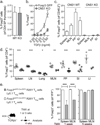Extrathymically generated regulatory T cells control mucosal TH2 inflammation
- PMID: 22318520
- PMCID: PMC3485072
- DOI: 10.1038/nature10772
Extrathymically generated regulatory T cells control mucosal TH2 inflammation
Abstract
A balance between pro- and anti-inflammatory mechanisms at mucosal interfaces, which are sites of constitutive exposure to microbes and non-microbial foreign substances, allows for efficient protection against pathogens yet prevents adverse inflammatory responses associated with allergy, asthma and intestinal inflammation. Regulatory T (T(reg)) cells prevent systemic and tissue-specific autoimmunity and inflammatory lesions at mucosal interfaces. These cells are generated in the thymus (tT(reg) cells) and in the periphery (induced (i)T(reg) cells), and their dual origin implies a division of labour between tT(reg) and iT(reg) cells in immune homeostasis. Here we show that a highly selective blockage in differentiation of iT(reg) cells in mice did not lead to unprovoked multi-organ autoimmunity, exacerbation of induced tissue-specific autoimmune pathology, or increased pro-inflammatory responses of T helper 1 (T(H)1) and T(H)17 cells. However, mice deficient in iT(reg) cells spontaneously developed pronounced T(H)2-type pathologies at mucosal sites--in the gastrointestinal tract and lungs--with hallmarks of allergic inflammation and asthma. Furthermore, iT(reg)-cell deficiency altered gut microbial communities. These results suggest that whereas T(reg) cells generated in the thymus appear sufficient for control of systemic and tissue-specific autoimmunity, extrathymic differentiation of T(reg) cells affects commensal microbiota composition and serves a distinct, essential function in restraint of allergic-type inflammation at mucosal interfaces.
Figures




Comment in
-
A division of labour.Nat Rev Immunol. 2012 Feb 24;12(3):154. doi: 10.1038/nri3180. Nat Rev Immunol. 2012. PMID: 22362347 No abstract available.
-
Commensal microbiota determine intestinal iTreg.Am J Transplant. 2012 Aug;12(8):1967. doi: 10.1111/j.1600-6143.2012.04217.x. Am J Transplant. 2012. PMID: 22845904 No abstract available.
-
From infection to colonization: the role of microbiota in transplantation.Am J Transplant. 2013 Apr;13(4):829. doi: 10.1111/ajt.12232. Am J Transplant. 2013. PMID: 23551627 Free PMC article. No abstract available.
References
-
- Maloy KJ, Powrie F. Intestinal homeostasis and its breakdown in inflammatory bowel disease. Nature. 474(7351):298–306. - PubMed
-
- Sakaguchi S, Yamaguchi T, Nomura T, Ono M. Regulatory T cells and immune tolerance. Cell. 2008;133(5):775–787. - PubMed
-
- Tone Y, et al. Smad3 and NFAT cooperate to induce Foxp3 expression through its enhancer. Nat Immunol. 2008;9(2):194–202. - PubMed
Supplemental References
-
- Stromnes IM, Goverman JM. Active induction of experimental allergic encephalomyelitis. Nat Protoc. 2006;1(4):1810–1819. - PubMed
-
- Burich A, et al. Helicobacter-induced inflammatory bowel disease in IL-10- and T cell-deficient mice. Am. J. Physiol. Gastrointest. Liver Physiol. 2001;281:G764–G778. - PubMed
Publication types
MeSH terms
Substances
Grants and funding
LinkOut - more resources
Full Text Sources
Other Literature Sources
Molecular Biology Databases

